If you have your dental checkups scheduled and wondering whether your dentist can tell if you vape, you might want to read this. Vaping is an alternative to smoking and might not be as obvious, but can your dentist tell if you vape? Read on to find out.
Can Dentists Tell If You Vape?
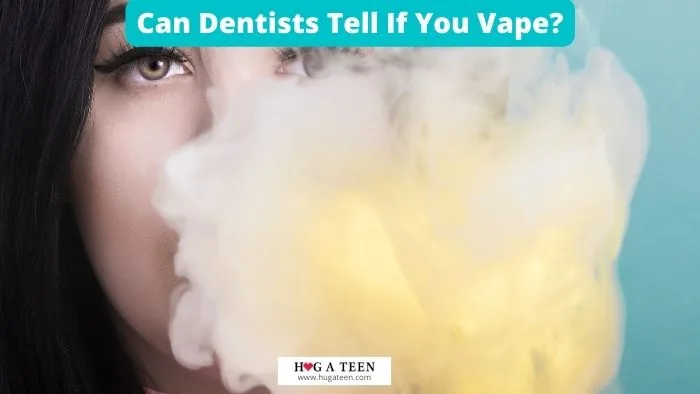
Dentists can tell if you vape simply because vaping, even though a safer alternative to smoking, has an impact on teeth. Vaping nicotine, just like smoking, has adverse effects on your oral health, specifically your teeth and gums.
How do dentists tell if you vape? Vaping, unlike cigarettes, does not contain tobacco. However, it has nicotine which has adverse effects on the mouth. An e-cigarette has an equal amount of nicotine to two to three packs of regular cigarettes; therefore highly concentrated with nicotine.
Nicotine, when mixed with saliva, creates yellow or brown stains on your teeth. This is not only bad for your dental aesthetics but has a negative impact on the enamel of your teeth. And, as you continue to vape, the stains will become more prominent and harder to remove, making them even more noticeable to the dentist.
Nicotine has bad effects on the gums too. Nicotine acts as a vasoconstrictor which impacts blood flow to the gum tissue. This leads to poor circulation, which is a top contributor to the risks of gum disease.
Therefore, nicotine is associated with several oral health issues, such as periodontal pockets, tooth loss, bone loss, and gum infections.
Even if you’re not vaping nicotine, a study published in Plos One, researchers from the American dental association found that some flavored vapes like Pineapple and Cotton Candy may be just as dangerous to teeth as chewy candy and acidic drinks.
Dentists are also concerned about all the chemicals in vaping liquids that have not been researched yet.
So if you have repeated vaping habits, you may be predisposed to these conditions that the dentists can recognize.
Watch this video which shows how long-term vaping can affect your teeth and gums:
Can the dentist tell your parents if you vape?
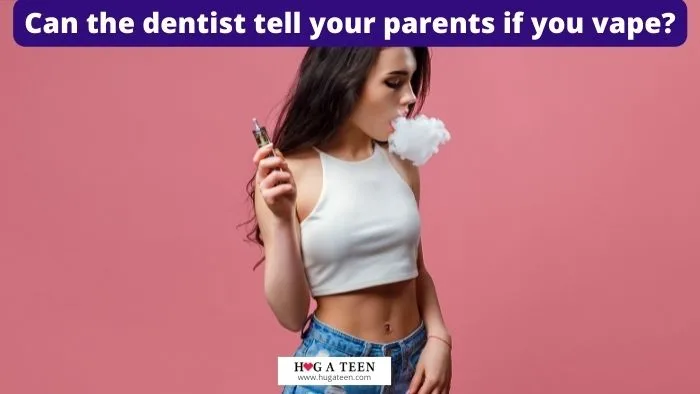
If you are a minor and under your parent’s health insurance, the dentist may tell your parents you vape. The dentist has the right to notify your parents to explain the health risks vaping has on your teeth. However, if you go to the dentist alone and request them to keep your personal information private, they may agree and keep it away from your parents.
It will most likely depend on how badly vaping has affected your teeth and gums, as well as on the relationship your dentist has with your parents.
If you’re over 18, your dentist won’t be able to tell anyone due to patient-doctor confidentiality.
How to hide that you vape from your dentist?
You can hide that you vape by popping fresheners before your dental appointment and not vaping before your dentist appointment. Brushing and flossing your teeth twice a day will also help you maintain good oral hygiene.
However, if you have been vaping for a long time, have stained teeth, and show other signs of vaping, your dentist will certainly be able to tell that you vape.
Can a dentist tell if you smoke rarely?
Your dentists will not be able to tell if you smoke rarely. If you smoke rarely but have been doing it for a long time, the dental effects of regular smoking might have started to surface, and the dentist can identify the signs of your smoking habits.
The effects can be more visible if you don’t maintain good oral hygiene while vaping.
How can a dentist tell if you vape?
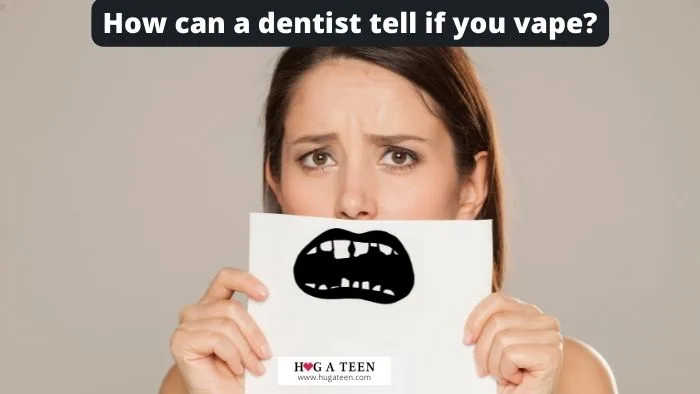
A dentist can tell if you vape if you present the signs of frequent vaping on examination.
These signs include:
- Stained teeth caused by nicotine.
- Dry mouth caused by the chemical propylene glycol, which absorbs moisture.
- Bad breath.
- Plaque build-up.
- Tooth decay caused by glycerin that helps bacteria stick to teeth, decreasing enamel hardness.
- Cavities caused by chemicals in vaping oils which break down the enamel, leaving the teeth more vulnerable to cavities.
- Gum inflammation.
- Gum recession.
- Gum diseases caused by reduced saliva, which increases the risks of plaque bacteria growth and gum disease.
- Stress-related issues such as teeth grinding.
Can the dentist tell if you vape once?
Your dentists cannot tell if you vape once, especially if it is not on the day of your appointment. Vaping once is not enough to affect your teeth and gum health; therefore, there are no signs tieing back to vaping that the dentist can highlight.
Can the orthodontist tell you vape?
The orthodontist can tell if you vape, especially if you have been doing it for a while and have developed signs of vaping. On examination, your orthodontist will examine the condition of your teeth and gums, and if they show the long-term effects of vaping, then your orthodontist will ask you to confirm their findings.
Can the dentist tell if you vape weed?
The dentist cannot tell if you vape weed simply because vaping weed can have the same effect as smoking nicotine has on your dental health.
Ingesting marijuana can give you a dry mouth. Having less saliva to protect your teeth and gums can lead to gum disease. However, as vaping nicotine can also cause a dry mouth, your oral health alone is not enough to tell if you vape weed.
Watch this video which shows what marijuana can do to your teeth:
Vaping Facts For Teens
A survey has shown that up to 37% of high school seniors and over 17% of middle-schoolers vaped in the previous year. This is why it is important to know the risks of vaping.
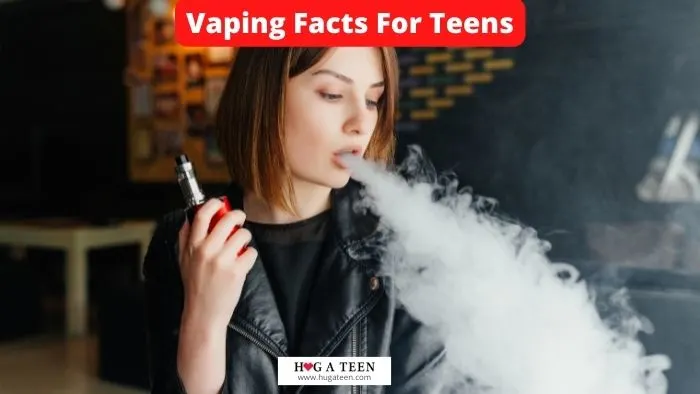
- Vaping can be more challenging to stop than smoking traditional cigarettes. One vape is equivalent to about 2 to 3 packs of regular cigarettes, more concentrated with nicotine and therefore harder to kill the nicotine addiction.
- Vaping can be addictive. The high nicotine levels in vapes can quickly get you addicted to vaping, also considering vapes are more bearable and easy to puff than regular cigarettes.
- Vapes are highly marketed to target teens. Most brands create them to taste like candy and have a fruity smell to attract a younger audience.
- The FDA does not regulate vaping products; therefore, there are no uniform standards on the amount of nicotine in these products.
- Vapes are not only designed for the consumption of tobacco and nicotine. Some brands formulate them to include marijuana as well.
- The majority of e-cigarette juice contains Propylene Glycol, which can cause eye and airway irritation. It is tasteless, odorless, and colorless alcohol used to lower freezing temperatures in antifreeze solutions. In addition to headaches and dizziness, it can also cause drowsiness.
- Vaping is not a better alternative to smoking. In fact, it is worse than smoking cigarettes due to its high nicotine levels, and unknown chemical ingredients.
Keep your mouth hydrated to prevent dryness and maintain your dental health.
Furthermore, brushing and flossing twice a day can minimize your risk of developing tooth decay and gum disease.
It is essential to visit your dentist once every six months to ensure your oral health is at its best.
Regularly check your tongue, gums, and other areas of your mouth for lesions or inflammation that may indicate oral cancer.
Related Vaping Questions
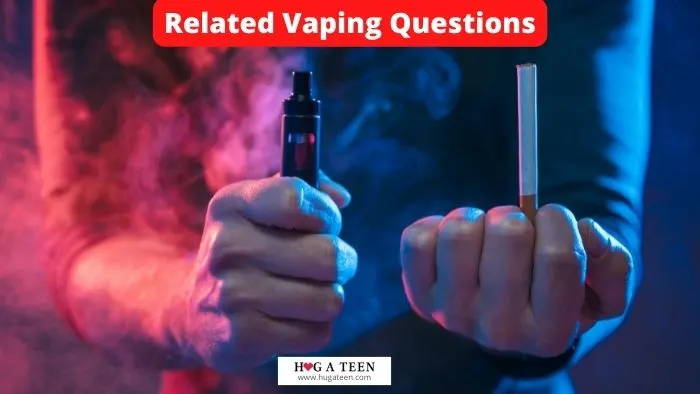
What Is Vaping?
Vaping entails inhaling and exhaling vapor released by a vaping device. Various electronic nicotine delivery systems, such as vapes and electronic cigarettes, emit vapor.
An electronic cigarette consists of a battery, a mouthpiece, a heating element, and a cartridge for the e-liquid—the battery fuels the heating element, which turns the e-liquid into an aerosol.
The liquid consists of flavors, chemicals such as Propylene Glycol, Vegetable Glycerine, and sometimes nicotine. The toxic chemicals in the liquid are suspected of causing respiratory and cardiac issues in humans.
Is vaping bad for your teeth?
Vaping is bad for your teeth; vape liquids warm up the mouth, creating a favorable environment for the growth and development of harmful bacteria. Bacteria build-up in the mouth then predisposes the mouth to several infections, affecting the health of teeth and gums.
Vaping stains the teeth by creating a yellow or brown tint to your teeth. This is not good for your dental aesthetics and may be challenging and expensive to fix.
Vaping dries your mouth but reduces saliva flow in your mouth. Vapes come with a chemical, Propylene Glycol, which absorbs moisture in the mouth, resulting in dry tissues and teeth. Since saliva works as a defense against tooth decay, reduced saliva increases the risk of plaque bacteria growth, tooth decay, and gum disease.
The chemical in vaping oils also breaks down the enamel, leaving the teeth more vulnerable to cavities. Additionally, vegetable glycerin and other flavorings used in vaping products help bacteria stick to the teeth, decreasing enamel hardness.
The effects of nicotine include increased stress-related issues such as grinding teeth. Vaping products can also increase inflammation and cause DNA damage. These can slow cell growth, leading to cell division and, eventually, cell death.
Ask your dentist how to best protect your teeth and gums from nicotine’s effects or cessation options if you want to quit.
Can you vape after wisdom teeth removal?
You can vape after wisdom teeth removal, but only after 48 hours have passed. This is because vaping generally dries your mouth, and after teeth removal, you need saliva to help in the gum-healing process. Waiting to vape after teeth removal also reduces the risk of pain, infections, and delayed healing.
Does vaping make your teeth yellow?
Vaping nicotine can make your teeth yellow. The enamel on your teeth (the hard outer surface) is porous, similar to the surface of your skin. Nicotine easily gets trapped in these pores, staining your teeth.
The good news is that these teeth stains are not permanent and can be removed with teeth whitening solutions at home or in the dentist’s office.
Maintaining good oral hygiene by brushing and flossing your teeth twice a day is vital if you want to minimize the effects of vaping.
What does vaping do to a teenager?
Vaping as a teenager affects the brain because it harms parts of the brain responsible for attention, learning, impulse control, and mood. Additionally, it leads to damaged teeth and gum health by increasing the risks of bacteria growth, discolored teeth, enamel wear, and periodontal disease.
